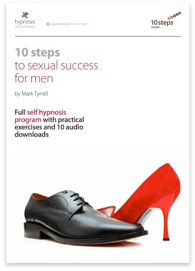How to Deal with Sexual Performance Anxiety
5 tips to enhance your sexual confidence
 Anxiety about sexual performance can spread to other areas of life
Anxiety about sexual performance can spread to other areas of life"This is going to sound crazy, but having sex feels like it used to when I'd lose my nerve on the rifle range. My dad would put me under so much pressure and I'd crack. It's the same emotion now when I think about my sexual performance!" Dean looked stressed out.
Performance anxiety - whether it's on the rifle range when you're 15 or in the bedroom when you're 25 - feels the same. It doesn't matter what the anxiety is about.
Dean's experience wasn't 'crazy' at all.
Worrying about outcome blocks performance. And sexual performance anxiety is no different. Sex needs to be relaxed, spontaneous, and fun; a chance to deepen intimacy and be absorbed only in the immediate...
Instead, many men feel it is a test of their manhood. But 'tests' can be passed or failed - and that's the problem.
Prefer to watch instead?
Sex isn't just about performance; it's not just about meeting standards or deadlines.
There is a pervading sense that to be a real man, guys have to be constantly and reliably ready for a supercharged, mind-blowing, supercalafragalistic sexual 'performance'.
Men are more likely to see sex in terms of 'doing it well', statistics, and 'results'; women are more likely to feel sex is about forging closeness in a relationship, togetherness and intimacy.
Sexual performance anxiety rears its head at some time during most men's sex lives. It can cause avoidance of sex altogether, as well as damaging self-esteem and confidence in non-sexual parts of life.
Dean's sexual performance anxiety had developed recently: "I've been having a tough time in my life, working late, money problems, and my dad got ill. I guess my confidence has been a bit low. I've never had a problem before with sex, but I can't stop thinking about my performance; whether I'll even be able to! And then during sex I'm just overthinking everything!"
Sexual desire is supposed to drop during times of stress (if a lion is on the prowl, sexual excitement needs to vanish so you can focus on your survival). With this in mind, let's look at the first tip:
1) Life health check: What's going on outside the bedroom?
If you feel anxious and stressed generally in your life then this can easily filter into your sex life. 'Stress' can come in the guise of too much alcohol, coffee, or tobacco (which all place stress on your body), as well as you working too hard or never taking time out to relax.
If your day is full of stuff that you have to 'get done' as best you can then tick it off your 'to do' list, it can be hard to change focus enough to just go with the flow and enjoy sex. Lovemaking can feel like the final 'to do' at the end of a long day.
Take steps to erase as many stressors as possible. Start to relax regularly, exercise, and take time out for non-competitive fun. Dean decided that there were certain changes he needed to make in his life to zap stress and ramp up relaxation.
He conceded his life was full of tick lists and work-related 'performance reviews' and he had unconsciously started to treat his lovemaking the same way.
2) Simply extract the anxiety from sexual performance
Dean was seeing sex as something he had to do well. I asked him to think of something he did that he enjoyed, which felt easy and totally unpressured. Eventually he told me that sometimes late at night he would play guitar "just because".
I asked him to close his eyes and get a sense of feeling in flow playing his guitar. I suggested that every activity needs some time of 'warming up' and this applies to sex too, of course; that it probably took him a few minutes to 'get into' playing guitar.
He started to smile as he conjured up the feeling of just enjoying his guitar times, being relaxed in the moment. I then asked him to "keep that relaxed, in flow feeling, but start to transfer it" in his mind to making love with his partner "just because". He found this incredibly useful and reported later that he felt this had made a huge difference to the way he felt during sex - like a "rediscovery".
3) You know it's a mind thing – here's how to use your mind
It's truly been said that the biggest sexual organ is the brain. It's wrong to think sex is just physical. Attitudes and the way your mind is focussed have a huge impact on your sexual experience. Your levels of arousal need to be just right.
Sometimes sexual excitement and arousal can spill over into anxiety (a not totally dissimilar type of arousal). You need just the right level of excitement blended with a confident sense of "let's relax and see what happens".
You also need to:
- Focus on the person you are with, to encourage those wonderful moments in which you feel totally connected - times when there is no longer 'you and me' but 'us as one'.
Actually, when you drift into this altered state, 'the zone', all thoughts of performance vanish - there is only now, this moment; the self is forgotten as you blend totally with what you're doing. Future and past disappear - which means that so too does overthinking about what might or might not happen. - Forget about the 'mechanics' of sex - whether you'll last or get and sustain an erection. Some guys I've worked with have even secretly timed themselves to try and 'up their game', lasting longer. Call me old-fashioned, but stopwatches and lovemaking?!
Wonderful sex is like great art or poetry in that it can't be 'graded' like a school maths project. A poem might be short and simple but someone, without really knowing why, just loves it. Your partner may really love a particular time with you "just because". Stop trying too hard and let what happens happen.
4) Stop being responsible
Mm, let me rephrase that: Be responsible as far as safe sex goes, but if you don't feel like sex, it is not your fault - so you shouldn't feel responsible. It's no one's fault. Sexual responsiveness is governed by the unconscious part of the mind - so the conscious you can relax about it.
If my pupils dilate or my stomach gurgles, I didn't consciously decide to do these things - another part of me controls these 'autonomic responses'. So I don't feel too responsible for these processes. It's exactly the same with sexual responsiveness: it's not completely under your control, so you can relax about it. And, of course, the more you relax about it, the easier and more natural it's going to feel.
Exercise: Close your eyes and imagine feeling relaxed and happy, unhurried but excited by the prospect of making love. Do this three or four times a day to recondition your responses and reduce the risk of erectile dysfunction or premature ejaculation.
5) Enjoy each other
Avoiding sex tends to increase sexual performance anxiety because avoidance fools your mind into feeling greater fear of whatever it is you're avoiding. But there are many physical pleasures to enjoy with your partner such as caressing, holding, and cuddling.
Sex is a part, but by no means all, of a wider physical relationship you have with your lover. Many women report loving the affection and closeness of hugging and holding whilst naked as much as, sometimes even more than, the act of sex itself. Focus on these aspects of your physical relationship and let sex be a by-product of that.
Dean started to think about sex differently: "It's no longer something that I feel I have to do," he told me. "Now, if it happens, it happens. Sex isn't an Olympic sport; it's a way of communicating."
Sexual performance anxiety stops when you stop seeing sex as a 'performance'. Take time to enjoy the moment and just see what happens.
10 Steps to Male Sexual Success course is 50% off for as long as lockdown lasts
Why hypnosis can help you claim your right to a confident, successful sex life...







